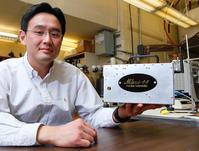Professor Ouyang Awarded an NIH R21 Grant
Professor Zheng Ouyang has been notified that he has been selected to received R21 funding from the National Institutes of Health. The funding will support his research on the development of a paper spray ionization mass spectrometry device for direct analysis of biofluid samples.
Mass spectrometry (MS) provides highly specific molecular information and can be used as the basis for clinical diagnoses. However, limited use has been made of MS for on-site clinical diagnosis or personal health care, areas where simplicity of operation and rapid results are essential. The causes of these limitations lie in the in time scale of MS and the need for complex sample pretreatment, as well as the special skills required for instrument operation and data analysis, and the size, cost and complexity of the current instrumentation.
The long term goal of this research team at Purdue is to develop miniature MS devices for a wide variety of point-of-care tests at clinic sites and ultimately also for personal health care. In this project, Ouyang proposes to develop a mass spectrometry sampling and ionization system that uses a simple disposable device and involves no sample preparation. The methodology and device will be based on paper spray as a direct sampling/ionization procedure that can be interfaced to a miniature ion trap mass spectrometer for chemical mass analysis. The target application is the analysis of the biofluid samples, especially dried blood spots. The specific aims include: 1) to develop a paper spray sampling/ionization method, 2) to develop a miniature MS system for biofluid testing, and 3) to develop quantitative methods and to improve device performance for therapeutic drug monitoring and measurement of associated metabolites and conjugates.
The proposed research is expected to establish and validate a new paradigm for performing MS-based point-of-care tests, involving simple operations but giving high sensitivity and specificity. The potential of paper spray as a direct sampling/ionization method for clinical applications will be fully explored. The technological challenges of developing a miniature MS device suitable for quantitative analysis of complex mixtures will be addressed. The capabilities of the integrated instrumentation and implemented analytical methods will be characterized and demonstrated in the case of therapeutic drug monitoring, a project that has a direct impact on the drug development as well as the personalized medicine. A representative set of therapeutic drugs including the chemotherapeutic imatinib, the immunosuppressive drugs sirolimus and cyclosporine A, the antiepileptic oxcarbazepine, and the antibiotic gentamicin will be used in this study.

